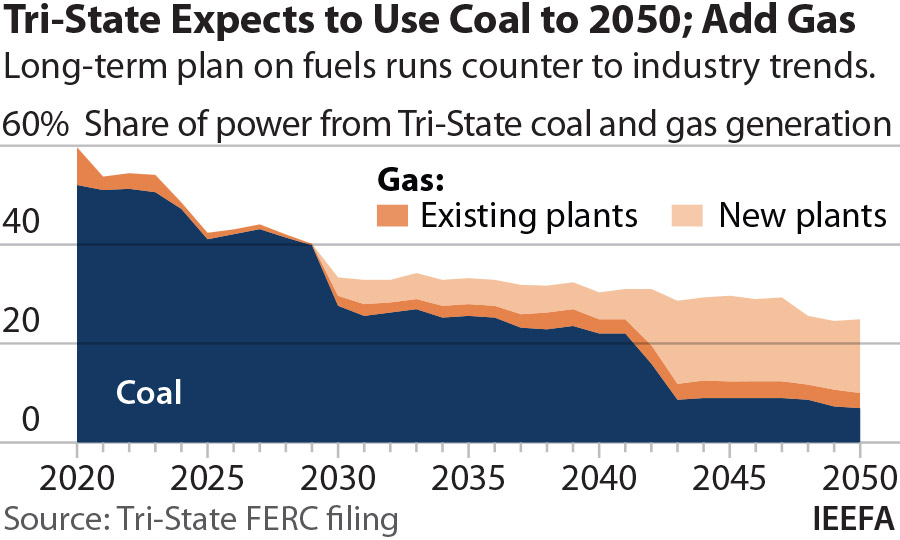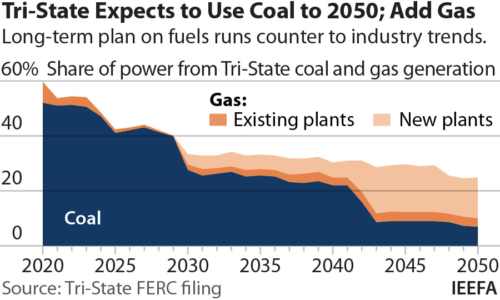IEEFA U.S.: Colorado electric wholesaler is alienating cost-conscious co-ops with its fossil commitments

 Nov. 17, 2020 (IEEFA) — One of the biggest power suppliers to rural electric co-ops in the U.S. is putting its business model at risk as members clamor for better access to renewable energy, more affordable rates, and more say in how they buy or produce power, concludes a report released today by the Institute for Energy Economics and Financial Analysis.
Nov. 17, 2020 (IEEFA) — One of the biggest power suppliers to rural electric co-ops in the U.S. is putting its business model at risk as members clamor for better access to renewable energy, more affordable rates, and more say in how they buy or produce power, concludes a report released today by the Institute for Energy Economics and Financial Analysis.
The report—With Long-Term Fossil Commitments, Colorado Electricity Wholesaler Is Alienating Cost-Conscious Co-ops—describes how Tri-State Generation and Transmission Association has angered and alienated member co-ops with its combative and domineering management style and how member dissatisfaction is growing.
The report describes three fronts on which Tri-State is losing member confidence:
- Planning to continue to rely heavily on coal-fired generation through the 2030s and to expand aggressively into gas-fired generation at the expense of renewables.
- Planning to increase wholesale rates to members almost annually beginning in 2030 at a rate that will amount to a 55% increase by 2050.
- Pursuing aggressive market-control practices that include regulator shopping and other costly legal maneuvers, as well as a public relations campaign based on significant omissions of information.
The report details filings to regulators that show Tri-State currently plans to draw about 25% of its power from coal-fired resources through the 2030s while simultaneously expanding into gas-fired power for about 20% of its generation—at a time when major utilities in the region are aiming for 100% renewable generation.
Report excerpts:
- “While Tri-State has portrayed itself publicly as a company on the vanguard of a fast-moving national transition toward cheaper power, it plans annual rate increases beginning in 2030 that will raise wholesale prices by 55% in the ensuing 20 years, increases brought on in part by debt tied to coal. Tri-State’s $76-per-megawatt hour (MWh) cost to members, which already exceeds market norms, will hit $118 per MWh by 2050.
- “A good part of the increase Tri-State envisions will come from its debt-laden ties to coal and expansion into gas, but in comparison, costs across the industry are actually falling with the rise and expansion of zero-fuel-expense power generation.”
- “Tri-State has recently adopted a strategy of ‘regulator shopping,’ seeking to bypass state rules by taking legally questionable steps to qualify for federal regulatory oversight. Members see it as a betrayal of local values and are now asking about the true purpose of Tri-State, why its executives are paid so much, and who exactly gains when it clings to an outdated model of high-priced power generation.”
“Change is imperative,” the report concludes. “Member disagreement over Tri-State’s commitment to fossil fuels will likely force the company to update its strategy. One possible outcome is that Tri-State’s role in the years ahead may simply become a “wires and poles” provider. Another is that it will become less committed to coal and gas and more responsibly invested in renewables.”
Full report: With Long-Term Fossil Commitments, Colorado Electricity Wholesaler Is Alienating Cost-Conscious Co-ops
Author Contact
Karl Cates ([email protected]) is an IEEFA analyst.
Media Contact
Vivienne Heston ([email protected]), +1 (914) 439-8921
About IEEFA:
The Institute for Energy Economics and Financial Analysis (IEEFA) examines issues related to energy markets, trends and policies. The Institute’s mission is to accelerate the transition to a diverse, sustainable and profitable energy economy.












